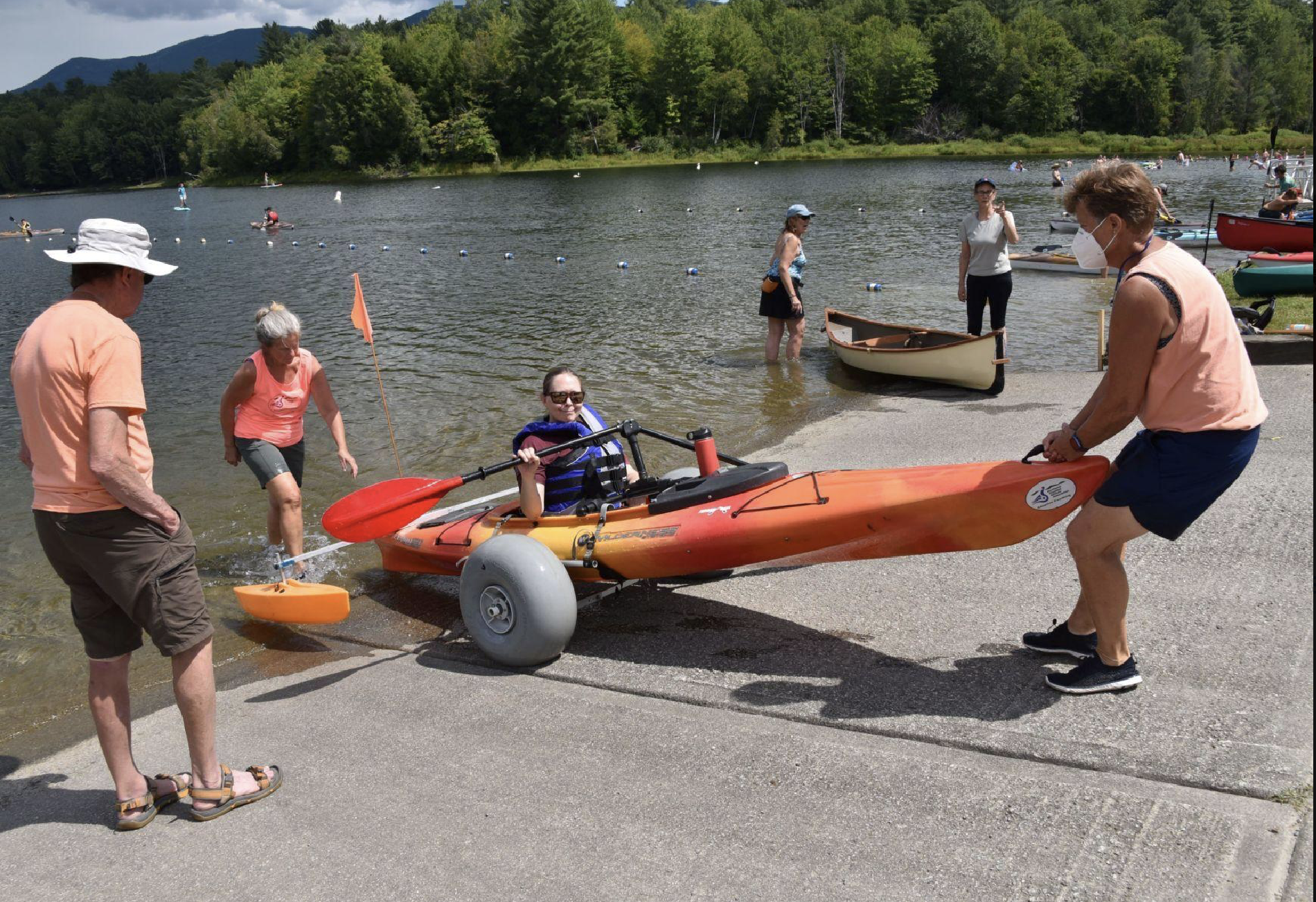Adaptive kayaking at Waterbury Center State Park
The adaptive kayaking program run by Northeast Disabled Athletic Association uses special equipment designed to assist the boaters as they enter and exit the water. Here, kayaker Amy MacDonald gets a hand setting in at the Waterbury Center State Park boat launch.
Visitors to Waterbury Center State Park this summer may have spotted an unusual sight on the shore: modified kayaks boasting big wheels to enter the water easier, angled paddles mounted on their sides and plastic buoys to prevent tipping.
The kayaks are part of a program run by Northeast Disabled Athletic Association, a Burlington-based nonprofit that provides more accessible athletic opportunities for people with physical disabilities. With partner organization Green Mountain Adaptive Sports, the association offers activities like power-wheelchair soccer, sled hockey, and sailing and kayaking with modified equipment.
The adaptive kayaking project launched in 2016 led by the nonprofit’s program manager and physical therapist, Cathy Webster. The goal was to provide kayaking opportunities to people whose physical disabilities make it difficult to use standard kayaks.
Sessions for adaptive kayaking, as the modified sport is referred to by folks in the field, were first offered only one morning a week, but the association now hosts three days where participants have allocated time slots for kayaking.
“It’s not only growing in numbers, but people want to come more often,” Webster said.
The program has six adapted kayaks available that all have high-back seats with adjustable side supports, stabilizing outriggers and a variety of assisted paddles. While participants kayak, a trained volunteer or family member stays within 20 feet just in case.
“Just a few simple changes allow them to get on the boat and take off,” Webster said during a recent outing.
The kayaks’ setup is catered to their specific needs and movement abilities of each participant. Webster recalled one kayaker who was extremely weak but was able to brace his elbows and paddle with only his index fingers. Another participant, who is quadriplegic and uses an electric wheelchair, has been able to kayak independently with the right adjustments.
“The freedom [of movement] it gives these people gives you goosebumps,” Webster said.
Kerry Boyle, the mother of a participant, shared some of her experiences with the program on a blog for Vermont moms, saying adaptive sports gave her family a “renewed love of movement.”
“I hadn’t thought of my son as having disabilities and had to reflect on what that word meant for my son and my whole family,” wrote Boyle. “If we couldn’t access recreational sports in our town, that seemed to mean we needed adaptations.”
She said the program gave her son a new opportunity for friendships, teamwork, exercise and community-building without judgment.
“(Green Mountain Adaptive Sports, one of the program partners,) knew what my son needed, provided him with access to equipment that worked for him and set him up with a specialty-trained physical therapist who took him kayaking weekly all summer,.” she said.
Webster said the program welcomes participants of any age and with any physical disability including strokes, head injuries, muscular dystrophy, spinal cord injuries, cancer or amputations. This year, the kayaking program also began working with the Community Senior Center of Richmond.
Many members use kayaking as a form of enjoyable rehab, Webster said. At the beginning of each season, Webster times how long it takes people to get from flag to flag and counts how many times the paddle hits the water. She does this again at the end of the season to see the difference. Last season, Webster said that there was a 20% improvement, which is significant considering that many of the kayakers have chronic illnesses and limited rehab potential.
In addition to physical improvements, Webster said the program’s members are building a community and making friends to go kayaking with every week.
“If you look over there,” Webster said, pointing to one of her members kayaking in the reservoir, “you can’t tell that man has a disability. You’re on the same playing field, eye-to-eye.”
The association encourages donations, but there’s no cost to participate. Those interested in adaptive kayaking can register through the group’s website, disabledathletics.org.








